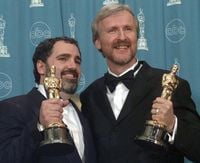On March 23, 1998, a spectacular night unfolded at the Academy Awards, marking a significant milestone in cinematic history as "Titanic" won 11 Oscars. This extraordinary achievement tied the record for the most Oscar wins—a feat previously accomplished by only a handful of films. Directed by renowned filmmaker James Cameron, "Titanic" captured the hearts of audiences worldwide and dominated the awards ceremony, which coincidentally celebrated Oscar’s 70th birthday that evening in Los Angeles.
The anticipation surrounding "Titanic" was palpable. Having already garnered numerous accolades, including an impressive haul of Golden Globes, the film was a favorite going into the Oscars. As James Cameron and his crew took center stage, they received recognition for Best Picture, Best Director, and Best Original Song for the hauntingly beautiful track "My Heart Will Go On," performed by Celine Dion. This ceremony will forever be etched in the annals of film history, the perfect culmination of a cinematic epic.
Not only did "Titanic" tie the Oscar record, but it also and achieved 10 Guinness World Records including the distinction of being the most expensive film ever produced and achieving the highest box-office gross for a drama. For nearly a dozen years, it reigned as the highest-grossing film globally, until it was eventually surpassed. However, to this day, it remains one of the top three biggest films of all time.
On this remarkable night, James Cameron wasn’t just celebrating a win but also solidifying his position as one of the most prolific directors in cinema history. Interestingly, Cameron has three of the top four all-time biggest box office hits, with "Avatar" at the top of that illustrious list. This speaks volumes of his storytelling ability and appeal to global audiences.
Oscar enthusiasts were reminded of the competition that "Titanic" faced in the realm of cinematic accolades. The 1959 classic "Ben Hur" had claimed 11 Oscars, while another milestone was reached in 2003 when "The Lord of the Rings: The Return of the King" swept all 11 of its nominations—marking a historic achievement in Oscar history.
With 14 Oscar nominations, "Titanic" had a robust showing, but the night belonged to Cameron's beloved tale of love and tragedy. With phenomenal performances, a gripping storyline, and breathtaking visual effects, it is no wonder that the film resonated so deeply with audiences and critics alike.
As we reflect on that iconic night in 1998, the impact of "Titanic" stretches far beyond the awards it received. It remains a cultural phenomenon, remembered not only for its box office success but also for the emotional resonance it holds for viewers. Its themes of love, sacrifice, and the human spirit continue to captivate new audiences, generations later.
Even today, as we look back at the 1998 Academy Awards, it’s clear that "Titanic" made an indelible mark on cinematic history. The film’s legacy, much like the ship it depicts, will continue to sail through the years, remembered and celebrated as one of the finest rare gems in filmography.
As we commemorate this event, we recognize the lines spoken by the unforgettable character Rose in the film, representing the unbreakable connection between art and audience, dreaming, and the power of storytelling. The legacy of an extraordinary era in cinema lives on through "Titanic," a film that transcended time and still continues to inspire.





